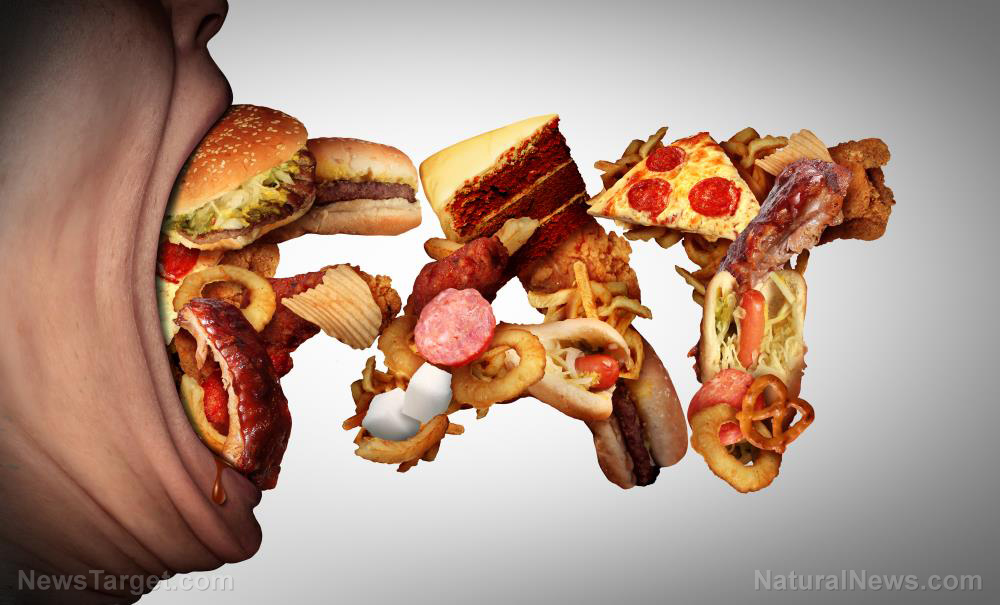Conveniently deadly: A diet of ultraprocessed foods increases risk of mortality
06/16/2019 / By Vicki Batts

It should be common knowledge by now that a junk food diet is no good for you. But researchers continue to be astonished by just how toxic processed foods and “ultraprocessed foods” really are. However bad you think that life of microwave meals and snack cakes is for you — well, the science shows it’s almost definitely worse.
A team of French scientists have found that for every 10 percent of your diet made up of processed foods, there is a 14-percent increase in overall mortality risk. In other words, the more junk food you eat, the more likely you are to die. Recently published research has also linked junk food consumption to “psychological distress,” which lends more proof to the “crazy” notion that your body is a single organism comprised of many organ systems — all of which need good nutrition to function properly. Somehow it has become “anti-science” to say that inadequate nutrient intake over the course of a lifetime can have ill effects on your health — and even cause disease.
Nutrition should be considered the primary driver of both health and disease. The fact that it is merely considered a “bonus” therapy patients sometimes get alongside pharmaceuticals is a travesty. Good nutrition is essential for life to thrive on this planet whether you’re a plant looking for more CO2 or a human that needs to get more vitamins.
The cost of convenience is your health
A new study published in JAMA Internal Medicine finds that a diet of processed and ultraprocessed foods isn’t just bad for your health — it might just put you in an early grave.
To conduct their research, scientists from the University of Paris looked at data from the French NutriNet-Santé Study. In total, they followed 44,551 people who were 45 years of age or older for an average of 7.1 years.
In the study, participants were asked to fill out surveys which asked about their diet, height, weight, lifestyle, physical activity levels and socioeconomic status.
Across the board, the results remained the same: A diet laden with ultraprocessed foods was tied to a higher risk of death — independent of other factors.
In the French study, the “high” end of processed food intake was anything over 20 percent of the diet. While getting one-fifth of your calories from processed junk is a lot, the average American gets a whopping 60 percent of their calories from processed foods. Twenty percent is modest compared to American processed food consumption.
Bad food rules
The findings of this study should be raising serious alarm, given that the takeaway from this research is that the more processed food you eat, the more harm you’re doing to your body.
And yet, many mainstream news sources have tried to downplay the findings of this study by saying it’s “inconclusive” because of its observational nature. Newsflash: Most processed foods are nutritionally inferior. The nutritional inadequacies of processed foods are well established: They’re high in added salt, sugar, fat and toxic additives, while also low in fiber, vitamins, and minerals, and are typically made of ingredients that have been stripped of their nutritive content. Yes, it is an observational study — but it’s also common sense.
Whenever a new study comes out, displaying the harmful effects of Big Food or their ilk, there is always a covert campaign to undermine the findings. Even researchers themselves are quick to say people should be cautious about the findings. Shouldn’t we have exercised caution before introducing a bevy of chemicals into the food supply?
See more coverage of real science news at Science.news.
Sources for this article include:
Tagged Under: bad food, death, death risk, fast food, mortality, obesity, real investigations, research, standard American diet, toxic ingredients, western diet
RECENT NEWS & ARTICLES
COPYRIGHT © 2017 FIGHTOBESITY.NEWS
All content posted on this site is protected under Free Speech. FightObesity.news is not responsible for content written by contributing authors. The information on this site is provided for educational and entertainment purposes only. It is not intended as a substitute for professional advice of any kind. FightObesity.news assumes no responsibility for the use or misuse of this material. All trademarks, registered trademarks and service marks mentioned on this site are the property of their respective owners.



















